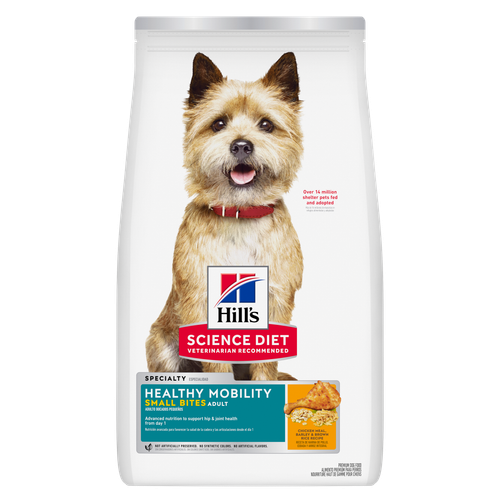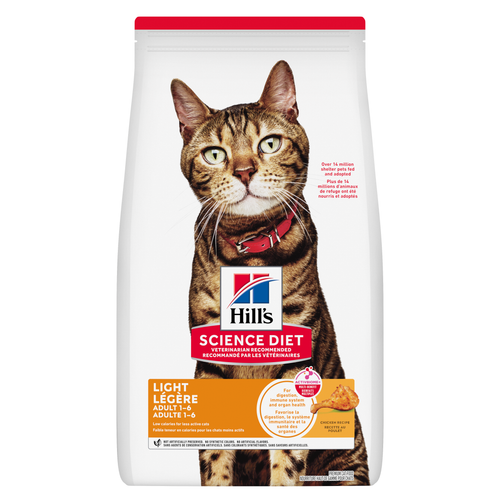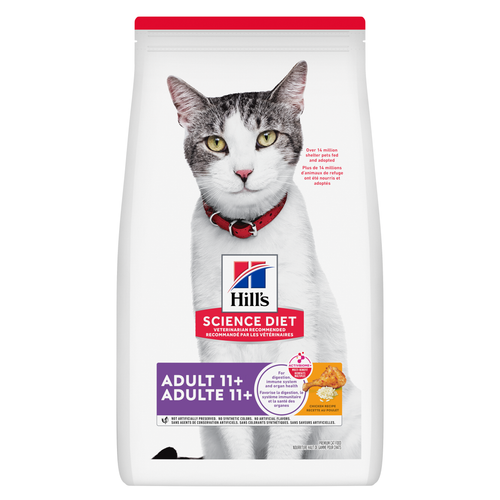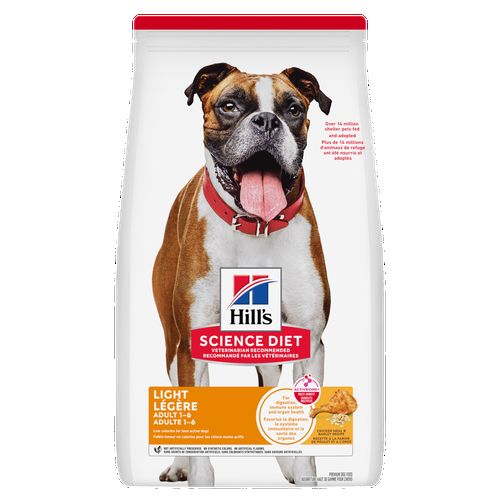
-
Find the right food for your petTake this quiz to see which food may be the best for your furry friend.Find the right food for your petTake this quiz to see which food may be the best for your furry friend.Featured products
 Adult Healthy Mobility Small Bites Chicken Meal, Barley & Brown Rice Recipe Dog Food
Adult Healthy Mobility Small Bites Chicken Meal, Barley & Brown Rice Recipe Dog FoodAdvanced nutrition to support hip & joint health from day 1
Shop Now Adult Sensitive Stomach & Skin Small & Mini Chicken Recipe Dog Food
Adult Sensitive Stomach & Skin Small & Mini Chicken Recipe Dog FoodHill's Science Diet Sensitive Stomach & Skin Small & Mini dry dog food is tailored nutrition for Small & Mini dogs while being gentle on stomachs. Nourishes skin & promotes a lustrous coat.
Shop Now Adult Light Large Breed Chicken Meal & Barley Recipe Dog Food
Adult Light Large Breed Chicken Meal & Barley Recipe Dog Food18% lower calories vs. Science Diet Large Breed Adult
Shop NowFeatured products Adult Light Chicken Recipe Cat Food
Adult Light Chicken Recipe Cat Food20% lower calories vs. Hill's Science Diet Adult
Shop Now Adult 11+ Chicken Recipe Cat Food
Adult 11+ Chicken Recipe Cat FoodSupports brain health & beautiful fur. Helps keep immune system, heart & kidneys healthy.
Shop Now Adult Healthy Cuisine Seared Tuna & Carrot Medley Cat Food
Adult Healthy Cuisine Seared Tuna & Carrot Medley Cat FoodDelicious seared tuna paired with tender carrots in a mouthwatering sauce
Shop Now -
Dog
- Dog Tips & Articles
-
Health Category
- Weight
- Food & Environmental Sensitivities
- Urinary
- Digestive
- Joint
- Kidney
- Dental
- Cancer
-
Life Stage
- Puppy Nutrition
- Adult Nutrition
- Senior Nutrition
Cat- Cat Tips & Articles
-
Health Category
- Weight
- Skin & Food Sensitivities
- Urinary
- Digestive
- Kidney
- Dental
- Stress
- Cancer
-
Life Stage
- Kitten Nutrition
- Adult Nutrition
Featured articles Importance of DHA in your Pet's Food
Importance of DHA in your Pet's FoodLearn about DHA, Docosahexaenoic Acid, a natural omega-3 fatty acid that is essential in the development of the brain and nervous system in cats & dogs.
Read More Antioxidants
AntioxidantsUnderstand the importance of antioxidants in your dog or cat's food, and how they can help protect your pet and keep them healthy.
Read More Water
WaterDiscover why water is the most important nutrient for your dog or cat to live a healthy life. Find out how much water your pet should consume each day.
Read More -


Related Image Content
The kidneys, the frequently forgotten but life-sustaining organs, remove waste from the bloodstream and regulate fluids in the body. If the kidneys are not able to do their job, the result could be life threatening for your dog.
What is kidney disease?
Kidneys are very important because they remove waste substances from the blood, and maintain the normal balance of fluid and minerals within the body. Any condition which damages the kidneys is referred to as kidney or renal disease. In some cases, dogs may show early warning signs of kidney disease. However, signs of serious illness only appear after 75% of the kidneys’ function has already been lost. This is the reason why early detection is so important, especially for dogs age 7 or older. A simple blood test and urinalysis are all that is required to detect kidney disease.
What causes kidney disease in dogs?
The kidneys can be damaged by a wide range of conditions including injury, infection, toxins, and cancer. This damage is usually irreversible. Kidney disease is common in dogs, but with early diagnosis and treatment, progression can be limited and many dogs go on to live happily for years after diagnosis. Factors that can make dogs more prone to kidney disease include the following:
Age: The chance of developing kidney problems in dogs increases after the age of 7.
Food: Some dog foods high in phosphorus and dog foods with increased levels of protein can increase the progression of kidney disease.
Breed: Some dog breeds, including English Cocker spaniels, bull terriers and German shepherds, are more likely to develop particular types of kidney disease. Learn more about a very special German shepherd named Buddy that was diagnosed with kidney failure.
Environment: Some chemicals, including certain disinfectants, antifreeze, lead paint and some human medications can damage the kidneys.


Tasty Tips
Does my dog have kidney disease?
The signs of kidney disease can be difficult to recognize but if you notice any of the following, it could mean your dog has a kidney problem. Please check with your veterinarian if you are seeing any of these signs.
- Increased thirst and urine production
- Decreased appetite
- Weight loss
- Bad breath
- Vomiting and diarrhea
- Sore mouth
- Weakness
- Lack of energy and increased sleeping
- Poor coat appearance
- Depression

If your dog is diagnosed with kidney disease, your veterinarian may describe it as either acute or chronic.
Acute Kidney Disease: Acute, or sudden, kidney disorders can be caused by:
- Blood loss
- Shock
- Surgical stress
- Trauma
- Severe dehydration
- Poisons
- Drugs
- Obstructed urine flow
- Infection
Chronic Kidney Disease: Chronic, or long-term, kidney disease can result from the above factors, plus: Breed and hereditary tendencies, in coordination with nutritional factors and immune system defects. Chronic kidney disease is progressive and irreversible.
Unfortunately, the signs of kidney disease usually do not appear until 75% of kidney function has been lost. Once chronic kidney failure develops, it cannot be reversed.
IMPORTANT: Early stages of kidney disease will show no signs or symptoms. An increase in thirst may be the first sign of kidney failure — if you notice this, or any of the above signs, consult your veterinarian immediately.
Treatment: The importance of nutrition
The food your dog eats plays an important role in his overall health and well-being. If your dog is diagnosed with kidney or renal disease, modifying his food can help manage the disease by reducing the amounts of protein, phosphorus and salt in his food. Phosphorus restriction seems especially important in lessening the severity of the clinical signs and progression of kidney damage. Reducing protein levels may also help restore normal acid-base levels. Balanced nutrition is an essential part of an active, healthy lifestyle. If your dog has kidney problems, the right nutrition can positively impact your dog’s quality of life. For accurate diagnosis and treatment options, always consult your veterinarian and ask them to recommend the best food for your dog’s kidney health.
Ask Your Veterinarian About Kidney Disease:
- Are there any foods I should avoid giving my dog because of his condition?
- Ask how human food may affect your dog’s health.
- Would you recommend a Hill’s® Prescription Diet® dog food for my dog’s kidney health?
- Ask about special nutritional concerns for your dog
- How much / how often you should feed the recommended food to your dog
- Discuss which treats you can feed your dog with the recommended food
- How quickly should I expect to see signs of improvement in my dog’s condition?
- Can you provide me with written instructions or a booklet on kidney disease for my dog?
- What is the best way (email/phone) to reach you or your hospital if I have questions?
- Ask if you need a follow-up appointment.
- Ask if a reminder email or notice will be sent.


One of our staff authors prepared this article for you
Related products

18% lower calories vs. Science Diet Large Breed Adult

Hill's Science Diet Sensitive Stomach & Skin Small & Mini dry dog food is tailored nutrition for Small & Mini dogs while being gentle on stomachs. Nourishes skin & promotes a lustrous coat.

18% lower calories vs. Science Diet Adult

Advanced nutrition to support hip & joint health from day 1
Related articles

Your dog's coat and skin are a big part of your dog's overall health. Ensure you keep your dog's coat healthy, by following these simple tips.

Learn how dogs with sensitive skin can have special dietary needs, how they can develop over time in a healthy dog, and how Hill's dog food can help.

Learn basic steps & precautions for treating a cut on your dog, including what you can put on the cut, and when you should take them to the vet.

Discover how the field of dog science is giving us more and more insights into the inner workings of our furry best friends.

Put your dog on a diet without them knowing
Our low calorie formula helps you control your dog's weight. It's packed with high-quality protein for building lean muscles, and made with purposeful ingredients for a flavorful, nutritious meal. Clinically proven antioxidants, Vitamin C+E, help promote a healthy immune system.
Put your dog on a diet without them knowing
Our low calorie formula helps you control your dog's weight. It's packed with high-quality protein for building lean muscles, and made with purposeful ingredients for a flavorful, nutritious meal. Clinically proven antioxidants, Vitamin C+E, help promote a healthy immune system.

